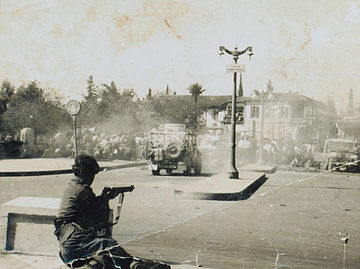Cyprus Emergency
| Cyprus Emergency | |||||||
|---|---|---|---|---|---|---|---|
| Part of the Decolonisation of Mediterranean Europe and the Cold War | |||||||
 A street riot in Nicosia during the Battle at Nicosia Hospital in 1956 | |||||||
| |||||||
| Belligerents | |||||||
|
Supported by: | |||||||
| Commanders and leaders | |||||||
|
|
| ||||||
| Strength | |||||||
|
|
300 fighters[2] 1000 active underground[3] | ||||||
| unknown | |||||||
| Casualties and losses | |||||||
| 457 dead[1] | 90 EOKA confirmed dead | ||||||
The Cyprus Emergency (Greek: Απελευθερωτικός Αγώνας της Κύπρου 1955–59), also known as the Greek Cypriot War of Independence or Cypriot War of Independence, was a conflict fought in British Cyprus between November 1955 and March 1959.[4]
The National Organisation of Cypriot Fighters (EOKA), a Greek Cypriot right-wing nationalist guerrilla organisation, began an armed campaign in support of the end of British colonial rule and the unification of Cyprus and Greece (Enosis) in 1955. Opposition to Enosis from Turkish Cypriots led to the formation of the Turkish Resistance Organisation (TMT) in support of the partition of Cyprus. The Cyprus Emergency ended in 1959 with the signature of the London-Zürich Agreements, establishing the Republic of Cyprus as a non-partitioned independent state separate from Greece.
History
Background
Cyprus was a territory of the Ottoman Empire from the late 16th century until becoming a protectorate of the United Kingdom under nominal Ottoman suzerainty in the Cyprus Convention of 4 June 1878, following the Russo-Turkish War. In 1915, Cyprus was formally annexed into the British Empire after the Ottomans entered World War I on the side of the Central Powers against the British, and was initially governed by a military administration until a decade later in 1925 when it was proclaimed the Crown Colony of Cyprus. From the 1910s to 1950s, Greek Cypriots became increasingly dissatisfied with British rule and supportive of Enosis, the concept of political unification between Cyprus and Greece. Several unsuccessful offers made to Greece by the British to cede Cyprus in exchange for military concessions, and the noticeable lack of British investment on the island, caused a growing Cypriot nationalist movement.
In 1954, Britain announced its intention to transfer its Suez military headquarters (the office of the Commander-in-Chief, Middle East)[5] to Cyprus.
Insurgency
On 1 April 1955, the EOKA insurgency began with 1 April Attacks. After a series of follow-up incidents, the Governor General Sir John Harding declared a state of emergency on 26 November of that year.[6] The British encountered great difficulty obtaining effective intelligence on EOKA as the majority of the Greek Cypriot population supported them. They were also hampered by a drain on manpower caused by the Suez Crisis and Malayan Emergency. Towards the end of the 1950s, the British enjoyed more success. Cyprus became an independent republic in 1960 with Britain retaining control of two Sovereign Base Areas, at Akrotiri and Dhekelia.
In January 2019, the British government agreed to pay £1 million to a total of 33 Cypriots who were allegedly tortured by British forces during the uprising. They included a woman, aged 16 at the time, who said she was detained and repeatedly raped by soldiers, and a man who lost a kidney as a result of his interrogation. The payout followed the declassification of government documents in 2012, although Foreign Office minister Alan Duncan stated that "the settlement does not constitute any admission of liability" but that "the government has settled the case in order to draw a line under this litigation and to avoid the further escalation of costs".[7]
See also
- Palestine Emergency (1944–48)
- Malayan Emergency (1948–60)
- Kenyan Emergency (1952–60)
- Nyasaland Emergency (1958–60)
- Suez Crisis (1956)
- Independence of Malta (1964)
References
- ^ a b "Cyprus Emergency Deaths 1955-1960 | findmypast.co.uk". www.findmypast.co.uk.
- ^ a b "Cyprus". www.psywarrior.com.
- ^ Kraemer 1971, p. 146.
- ^ Lim, Preston Jordan (2018). The Evolution of British Counter-Insurgency during the Cyprus Revolt, 1955–1959. Springer. p. 12. ISBN 978-3-319-91620-0.
The term "Cyprus Emergency" more precisely refers to events occurring between November 26, 1955, when Governor John Harding declared an official state of emergency, and Grivas' departure in March 1959.
- ^ Richard J. Aldrich, Ming-Yeh Rawnsley, The Clandestine Cold War in Asia, 1945–65: Western Intelligence, Propaganda and Special Operations, Routledge, 2013, 106.
- ^ "State Of Emergency Declared In Cyprus". The Central Queensland Herald (Rockhampton, Qld. : 1930–1956). Rockhampton, Qld.: National Library of Australia. 1 December 1955. p. 13. Retrieved 17 November 2013.
- ^ "UK government pays damages to 33 Cypriot pensioners". BBC News. 23 January 2019.
Bibliography
- Kraemer, Joseph S. (Winter 1971). "Revolutionary Guerrilla Warfare & the Decolonization Movement". Polity. 4 (2): 137–158. doi:10.2307/3234160. JSTOR 3234160. S2CID 155657462.
Further reading
- French, David (2015). Fighting EOKA: The British Counter-Insurgency Campaign on Cyprus, 1955–1959. Oxford: Oxford University Press. ISBN 978-0198729341.
- Holland, Robert (1998). Britain and the Revolt in Cyprus, 1954–1959. Oxford: Clarendon Press. ISBN 9780198205388.
- Novo, Andrew R. (2010). On all fronts: EOKA and the Cyprus insurgency, 1955-1959 (D.Phil Thesis). University of Oxford.
- Durrell, Lawrence (1957), Bitter Lemons of Cyprus. London: Faber. ISBN 0571061869
External links
- Cyprus Exhibit at National Army Museum
- Cyprus – Fighting the EOKA

